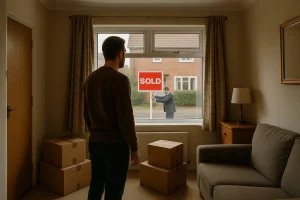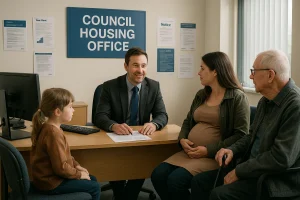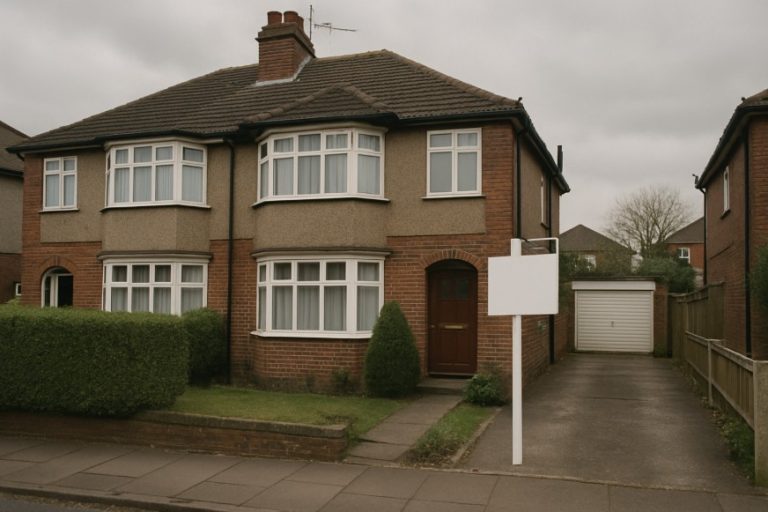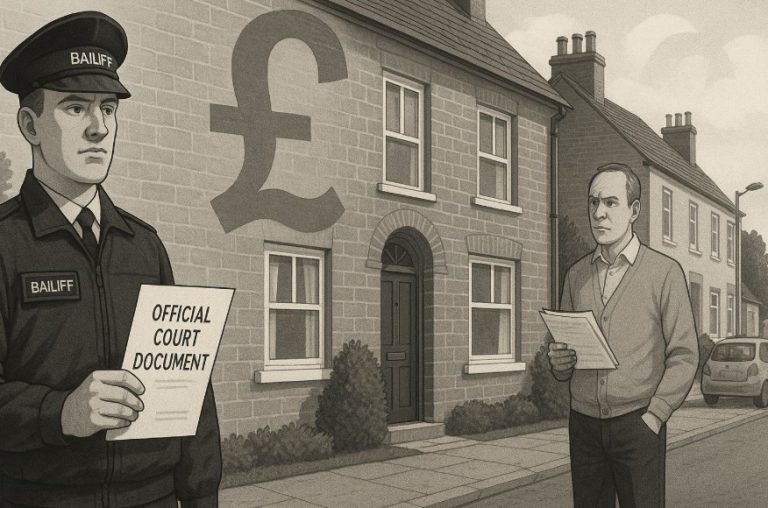When a landlord decides to sell a rental property, tenants often face uncertainty and stress. For many, the biggest concern is whether they’ll be forced to leave and if so, whether they’ll have anywhere else to go.
In the UK, where the demand for rental housing continues to rise, this situation is becoming increasingly common.
This article provides a clear, professional explanation of what your rights are as a tenant, and what kind of support you can expect from your local council if your landlord is selling the property you’re living in.
What Happens If Your Landlord Sells the House You’re Renting?

When a landlord decides to sell a property that is currently being rented, they are not automatically entitled to evict the tenant. Tenants have legal rights that remain in place throughout the sale process.
If you’re renting on a fixed-term tenancy, your agreement is valid until the end of the term. The landlord or the new property owner must honour the terms until the contract ends.
In the case of a periodic tenancy, your landlord can still sell the home, but they must give you the correct notice using a Section 21 or Section 8 notice depending on the circumstances.
A new owner who buys a tenanted property effectively becomes your new landlord. They must follow the same legal requirements and cannot force you out without going through the formal eviction process.
It’s important to remember:
- A tenancy does not end automatically when the property is sold
- The new owner inherits the tenancy as it stands
- Any changes must follow legal procedures, including providing written notice
Can the Council Help If You’re Facing Eviction Due to a Sale?
If you’re facing eviction because the landlord is selling the property and you do not have alternative housing, you may be eligible for assistance from your local council. You can make a homeless application even before you are physically removed from the home.
The council has a legal duty under the Housing Act 1996 and the Homelessness Reduction Act 2017 to assess anyone at risk of homelessness. If you qualify, they must help you find accommodation and prevent homelessness where possible.
Situations where the council can assist include:
- If you’ve been served a valid notice and have no other accommodation
- If you’re being evicted legally and will be homeless within 56 days
- If you are in a vulnerable housing situation and have nowhere to go
The council may provide short-term housing or help you secure private accommodation, depending on your situation and whether you meet the criteria for further assistance.
What Support Can the Council Offer If You’re Made Homeless?
Once you submit a homeless application, the council will investigate your circumstances and determine the level of support they can offer. This includes whether you qualify for emergency or long-term housing help.
Depending on your case, the council may offer:
- Temporary or emergency accommodation such as hostels, B&Bs, or supported housing
- Assistance in finding privately rented accommodation, including financial support for deposits or rent in advance
- Access to social housing, although waiting lists can be lengthy
- Advice and support through housing officers and caseworkers
The type and speed of help you receive will depend on your eligibility and the council’s housing availability.
What is Considered a “Priority Need” by the Council?

One of the key factors in determining whether you will receive accommodation from the council is whether you are considered to have a “priority need.”
A person has a priority need if they fall into specific categories that make them more vulnerable in a housing crisis. These categories include:
- People with dependent children
- Pregnant women
- Young people leaving care
- Those with disabilities, physical or mental health issues
- Victims of domestic violence
- Individuals made homeless due to fire, flood, or disaster
Below is a comparison of common housing circumstances and how they typically impact priority need assessment:
| Circumstance | Priority Need Likely? |
| Single, healthy adult with income | Unlikely |
| Single parent with children | Likely |
| Disabled individual | Likely |
| Pregnant person | Likely |
| Recently released from prison | Case-specific |
| Young adult leaving care | Likely |
| Evicted due to rent arrears (no dependents) | Unlikely without health issues |
The council will assess this on a case-by-case basis. Being in priority need means the council is required to offer suitable housing. If you do not qualify as priority, they still have a duty to help you prevent or relieve homelessness, but not necessarily to provide accommodation.
Can the Council Help You Stay in Your Current Home?
Preventing homelessness is a legal obligation for councils, and in some situations, they may help you remain in your current property. This is especially relevant if your eviction is due to financial hardship or rent arrears and not directly related to the property sale.
Options the council may explore include:
- Creating a payment arrangement with your landlord if arrears are the issue
- Offering financial support through hardship grants or Discretionary Housing Payments
- Mediating with the landlord to extend the tenancy or delay the eviction date
- Helping with access to legal support or housing advocacy
In cases where you are particularly vulnerable due to a disability, illness, or other support needs, the council may also work with health and social care teams to provide supported living solutions.
However, if the landlord has already initiated the legal process of sale and is not willing to negotiate, these efforts may have limited impact.
What Should You Do When Your Landlord Decides to Sell?
When you’re informed that your landlord intends to sell the property, early action is essential. The sooner you engage with the council and prepare, the better your chances of accessing help.
Here are immediate steps tenants should take:
- Contact your local council’s housing team and explain your situation
- Request information on how to make a homeless application
- Keep all written communication from your landlord or estate agent
- Retain your tenancy agreement and any notice served (e.g. Section 21)
- Document any issues related to the sale, such as property viewings or pressure to leave
If you receive an eviction notice, the council may advise you to stay in the property until the notice expires and a court order is issued. Leaving before this could be considered voluntary homelessness.
How Can You Avoid Being Considered “Voluntarily Homeless”?

The council can refuse to provide housing support if they determine that you have made yourself intentionally or voluntarily homeless. This often happens when tenants leave a property before being legally evicted or without exploring all available support.
To protect yourself:
- Do not leave the property just because the landlord asks you to
- Wait until the eviction process has followed legal procedures
- Make a formal homeless application before your eviction date
- Cooperate with the council’s housing officers during the process
Being considered voluntarily homeless can prevent you from receiving both emergency accommodation and long-term housing assistance. It’s critical to stay in your home until you have been legally evicted or until the council has found a suitable alternative.
Can the Council Intervene in Cases of Harassment or Illegal Eviction?
Tenants are protected by law from harassment and unlawful eviction. If your landlord or letting agent is trying to force you out without following the legal eviction process, you have the right to report it.
Harassment or illegal eviction can take many forms:
- Locking you out or changing the locks
- Turning off gas, electricity, or water
- Entering the property without proper notice
- Threats or intimidation
- Pressuring you to leave before the end of the notice period
Local councils have tenancy relations officers or housing enforcement teams that can investigate your case. If the landlord is found to have acted unlawfully, the council can issue enforcement notices or take legal action.
In some instances, councils may support tenants in taking the landlord to court. Harassment and illegal eviction are criminal offences, and landlords can face prosecution, fines, or imprisonment if found guilty.
Below is a summary of landlord behaviour and the council’s potential response:
| Landlord Behaviour | Council Action |
| Serving proper notice | No action unless tenant becomes homeless |
| Locking tenant out without court order | Investigate for illegal eviction |
| Pressuring tenant to leave without notice | Issue formal warning or prosecute |
| Denying access to utilities | Enforcement for tenant protection |
| Frequent visits without notice | May be considered harassment |
Reporting these behaviours early is vital. Keep evidence such as messages, emails, and photographs to support your case when dealing with the council or legal advisers.
Conclusion
The sale of a rented property can place tenants in a difficult and uncertain position. However, UK councils have a legal duty to support individuals who may become homeless as a result of such sales.
Tenants are advised to act early, know their rights, and avoid actions that could harm their eligibility for council support. Whether it’s through finding new housing, assisting with legal processes, or preventing unlawful eviction, your local council can be an essential resource during this challenging time.
FAQs
What notice period must a landlord give when selling a rented home?
Landlords must serve a minimum of two months’ notice under a Section 21 notice. The exact period may vary depending on the tenancy type.
Can I be evicted if my fixed-term tenancy hasn’t ended yet?
No, your landlord cannot legally evict you during a fixed-term tenancy unless you breach the contract. The property can be sold, but the new owner must honour your existing tenancy.
Will the council always provide emergency housing?
Emergency housing is only provided if you are eligible and considered a priority need. The council will assess this based on your personal circumstances.
What documents do I need for a homeless application?
You’ll typically need ID, proof of income, tenancy agreements, eviction notices, and any evidence of communication with your landlord.
What if the new landlord wants me to leave immediately?
The new owner must still follow legal eviction procedures. Immediate removal without notice or a court order is illegal.
How long does the council take to process a housing application?
Timescales can vary, but initial assessments usually happen within a few days. Temporary accommodation may be provided sooner if you’re in crisis.
Can the council help with moving costs or deposits?
Some councils offer rent deposit schemes, loans, or grants to assist with moving into a new property, especially for those at risk of homelessness.






